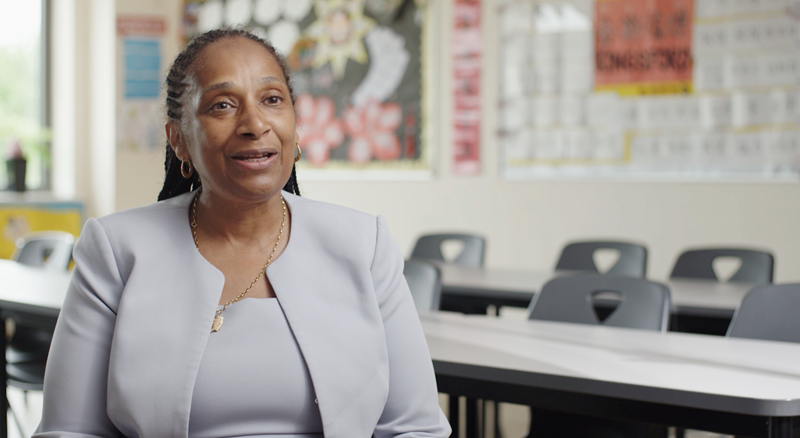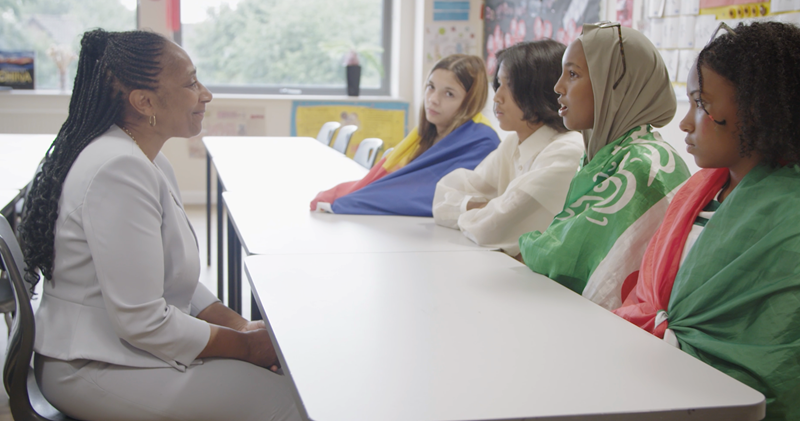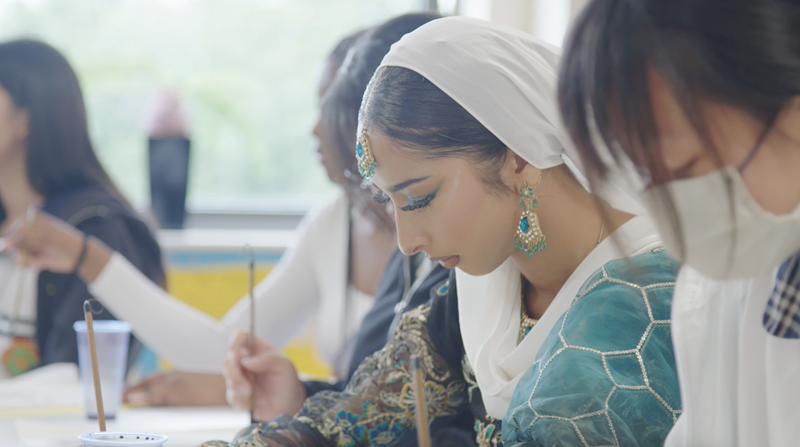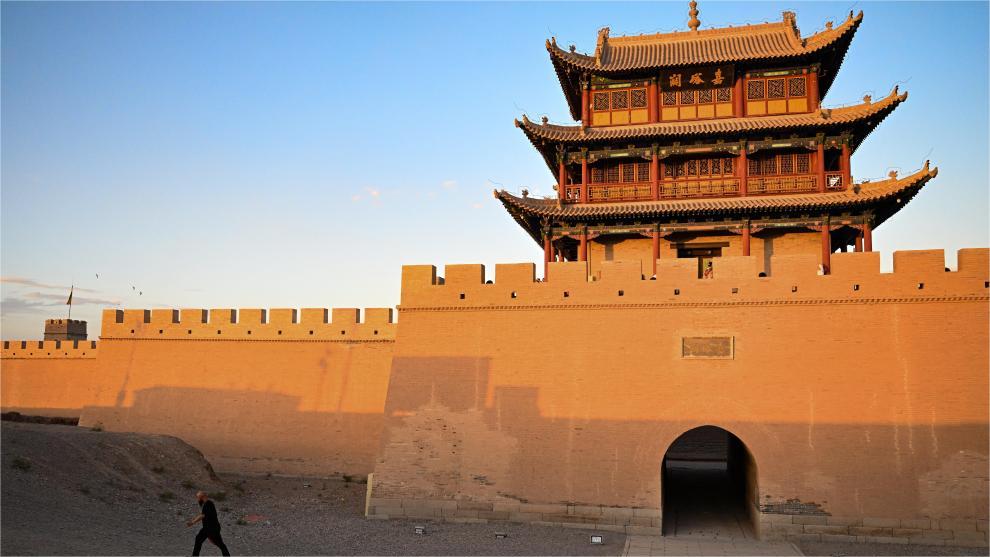Joan Deslandes: From learning Chinese to becoming global citizens
“If you can read Chinese, you are ready for the 21st century” is a sentence which many students at Kingsford Community School are familiar with. In 2000, Kingsford became the first school in the UK to introduce a compulsory Chinese curriculum. Since then, Chinese has become an inseparable part of this diverse community, thanks to the vision and dedication of, Joan Deslandes OBE, Kingsford’s Head Teacher.

Joan Deslandes. (Photo/Patrick Shead-Simmonds)
Deslandes first visited China in 2000 and was fascinated by this modern, thriving country, as well as China’s great focus on ensuring educational provision. Under her leadership, Kingsford developed a rich Chinese program ranging from calligraphy lessons and Spring Festival celebrations to work experience and trips to China. Kingsford also regularly works with various Chinese schools. On the day of the interview there was a group of exchange students from China's Taiwan region.
Kingsford is now an international school and a Confucius classroom, hoping to foster effective global citizens. Students of Kingsford come from diverse cultural backgrounds and economic levels, which is quintessential to the learning community. Over 70 different languages are spoken and celebrated among the student and staff population. Our interview coincided with Kingsford’s Culture Day celebration, where students all wore various traditional outfits.
Deslandes has collaborated with the UK Independent School sector to offer more opportunities to young people from underserved backgrounds. She is also working on training programs for teachers at Kingsford and in China. In the future, Deslandes hopes to continue her inspiration in the field of education, supporting students and teachers from around the world.
The importance of learning Chinese

Joan Deslandes with students in the classroom. (Photo/Patrick Shead-Simmonds)
Deslandes’ decision to introduce Mandarin in 2000 as a compulsory language for all students at Kingsford was based on two considerations. First, China has an entirely different language and culture to the UK, so offering Chinese as a subject would spread global understanding and support students to become effective global citizens. She was also conscious that China has a very rich history, which many students knew nothing about, and learning the language offers insights into that. Chinese is also the only language that no student at Kingsford could speak at the time.
Two decades ago, Deslandes already firmly believed that “learning Chinese was going to open the minds of young people and expose them to a world that they had not encountered before.” Since then, teaching Mandarin has been a very important aspect of the international dimension at Kingsford. It allowed students to understand and appreciate different cultures, different people, and different ideas, as well as broadened the inter-country and inter-cultural competencies of students, which Deslandes considers essential skills in the modern world.
The success of Mandarin lessons offered at Kingsford are reflected in the students’ performance at competitions. Each year, students at Kingsford have either achieved first or second place in the national Mandarin speaking competition. The students have also traveled to China for the Chinese Bridge Competition to compete against young people from over 100 different countries and celebrate the beauty of the Chinese language. Deslandes considers this to be a brilliant opportunity that “brings young people together to collaborate and learn from each other through the medium of learning Mandarin and Chinese culture.”
Chinese programs at Kingsford

Students learn calligraphy at Kingsford Community School. (Photo/Patrick Shead-Simmonds)
As part of Kingsford’s curriculum, students go on school trips to China each year. Kingsford has many partner schools in China, with the Affiliated High School of Peking University being the main partner. During these trips, students collaborate with their peers in China, and learn about each other, as well as their cultures. Deslandes believes that “young people from different countries have diverse paths and heritages. But together, they share a common future.” Kingsford students also go on work experience in China. For example, students who study child development are given the opportunity to work in a nursery in China as teaching assistants.
Kingsford regularly works with Chinese organizations to put on events related to Chinese culture. Deslandes recalled the memorable calligraphy exhibition, “Greetings from the East,” in 2019, which was provided by a team of experts from Peking University. Students at Kingsford were able to develop their skills in calligraphy and received many insights on the importance of calligraphy as part of the Chinese heritage. Recently, the students celebrated International Chinese Language Day at the Chinese Embassy in the UK. Alongside other young people across the UK, they celebrated the exceptional benefits of learning Chinese and shared their interest in Chinese culture.
Kingsford is a hub school for the Confucius classroom. Kingsford became the first Confucius classroom in 2007 and was awarded the title of 'Best Confucius Classroom in the World' by the Chinese Minister of Education in 2012. The Confucius classroom has a very keen focus on supporting other schools to introduce Mandarin to their curriculum, as well as Chinese history and culture. Kingsford has shared its courses and approaches in teaching Mandarin with other schools, as well as helping their development in the delivery of Mandarin lessons. Deslandes is very pleased that Kingsford was able to support other schools in developing global citizenships and their curriculum’s international dimension through these means.
Kingsford is also a national hub school of the Mandarin Excellence programme, founded by the UK Department for Education in 2016. This programme aims to support pupils in secondary schools in England to study Mandarin. The program has a sharp focus on ensuring that young people, who will be brilliant future engineers, linguists, lawyers, doctors, develop those competencies alongside learning Mandarin. Young people from Kingsford, who have learned Chinese, have gone on doing great things in terms of academics and career development. Several former students at Kingsford are now working either in China or with Chinese companies, and they are glad that they had the opportunity to learn Chinese in school.
Empowerment through education
As an educator, Deslandes is dedicated to providing quality education to students from underserved backgrounds. She has led collaborations with leading UK independent schools to set up the London Academy of Excellence, a Sixth Form in East London, whereby the students with the most academic abilities are able to learn from the work of independent schools. Consequently, many young people are going to Russell Group universities in numbers that have never been seen before. Deslandes believes state and independent partnerships are very important in terms of developing the education system in the UK.
Deslandes loves the role as an educator because an educator never stops learning and learns from people every day. She is discussing a program on training teachers from Kingsford and from universities in China. She said that “when you are learning to be a teacher and developing your subject knowledge and expertise, drawing from the perspectives of teachers in another country is not only enriching and developmental, but it provides insights into teaching delivery that could not be encountered otherwise.” In the future, she hopes to build on the foundation laid at Kingsford by supporting and empowering teachers and young people from all over the world.
Deslandes called on educators to value and cherish everyone, no matter who they are. She suggests that “it is really important for schools to recognize that for a young person to be empowered we should not only focus on their academic development, but also personal and character development.” Above all, she desires every pupil at Kingsford to feel confident and content in their own identity. She believes that every young person has unique talents, and the role of educators is to nurture these talents and help them to shine and flourish.
(Web editor: Hongyu, Wu Chengliang)












